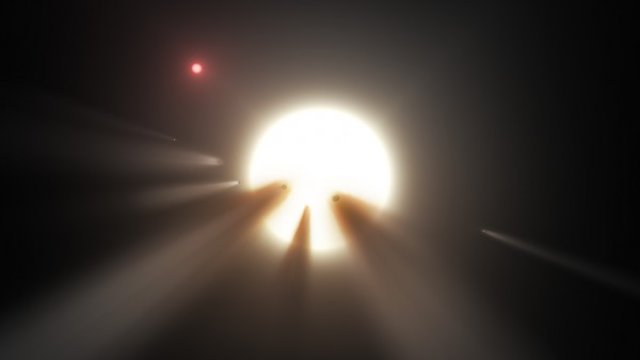
Retired astrophysicist and current University of Arkansas math professor Dr. Daniel Whitmire says Planet Nine’s suspected multi-million year orbit around the sun may trigger comet bombardments. His analysis suggests this happens about once every 27 million years.
How does this happen? Planet Nine passes through the Kuiper Belt, a region of space beyond the outermost planets that is the breeding ground for comets and asteroids alike. As the planet passes through this region, it disrupts the paths being followed by comets, sending some of them hurtling toward the inner solar system.
Whitmire’s research found that some of these comets not only would end up striking Earth, but that they would also disintegrate in large numbers, effectively lowering the amount of solar radiation reaching the Earth. Furthermore, Whitmire was able to match the theorized interval of Planet Nine’s orbit through the Kuiper Belt to mass extinction events here on Earth, lending credence to paleontologist theories that the death of the dinosaurs and other prehistoric creatures may indeed have been the result of comet impacts.
“There is not a perfect one-to-one correlation,” Whitmire told Digital Trends in an interview Friday. He attributed the events that did not correlate to statistical randomness. “Nonetheless the statistical analysis shows a strong regular period of 27 million years.”
Whitmire already showed back in 1985 — when he first started looking into the possibility of Planet Nine-related comet barrages — that the pattern held for at least the last 250 million years. Newer research suggests that these barrages may actually have been happening for as much as 500 million years, and quite possibly longer.
The latest comet shower is thought to have occurred around 11 or so million years ago, around the time of the Middle Miocene mass extinction. Before that, similar events were thought to have occurred around 38 and 66 million years ago, the latter thought to be the comets that killed off the dinosaurs.
Don’t ring the alarm bells though for the next bombardment. Humankind will likely be dramatically evolved (if hopefully not long gone) by the time Planet Nine passes through the Kuiper Belt again. “Modern man doesn’t have worry about the next comet shower for 16 million years,” Whitman quipped.


